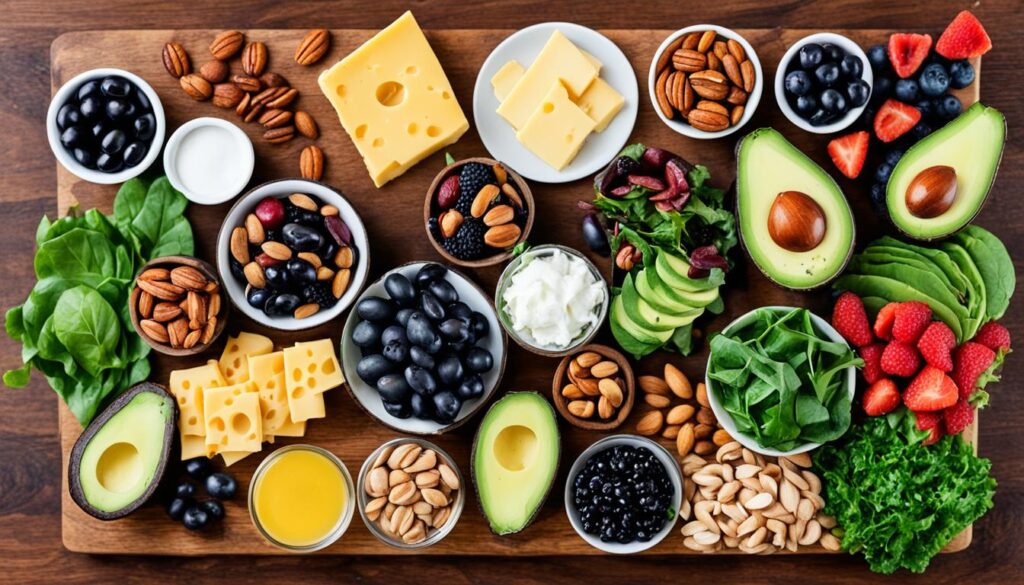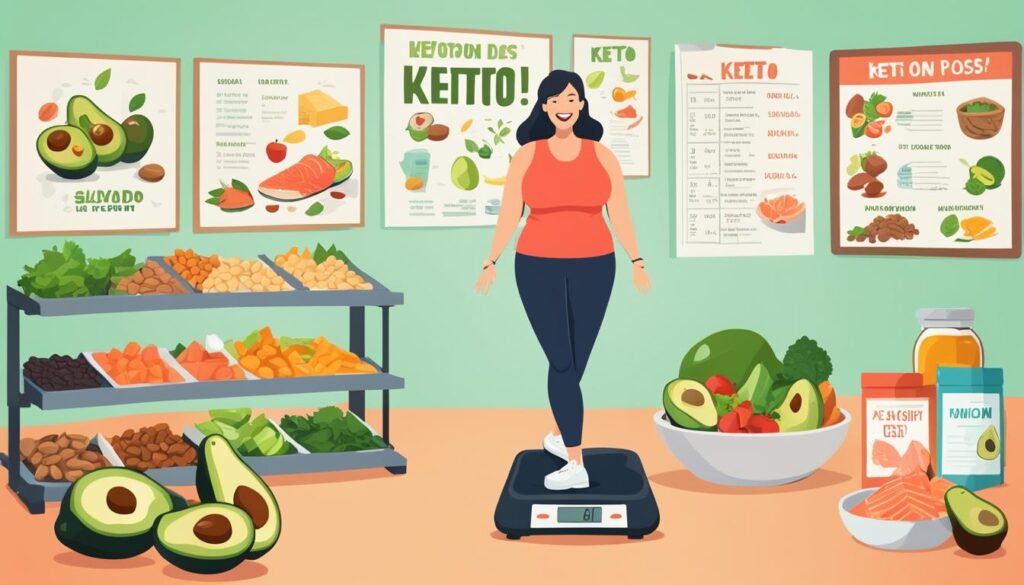Welcome to my beginner’s guide on starting a ketogenic diet. If you’re looking to embark on a keto journey, you’ve come to the right place. In this guide, I will provide you with essential tips and information to help you get started on your keto diet for beginners. Whether you’re aiming for weight loss or simply want to improve your health, the ketogenic diet can be a powerful tool to achieve your goals.
The ketogenic diet, commonly known as the keto diet, is a low carb, high fat diet that focuses on getting your body into a state of ketosis. Ketosis occurs when your body switches from using carbohydrates as its primary fuel source to using fat for energy. This metabolic state offers numerous health benefits, including weight loss, improved brain function, and increased energy levels. Although initially developed for medical purposes, the keto diet has gained popularity among individuals seeking a sustainable and effective approach to weight loss.
Before we dive into the specifics of the ketogenic diet, let me share some background information. Created in the 1920s, the keto diet was primarily used to treat epilepsy. Over time, researchers discovered that this diet not only helped control seizures but also had positive effects on other aspects of health, such as weight management and overall well-being. Today, it is widely recognized as a viable option for individuals looking to transform their health and lifestyle.
Are you ready to learn how to start a ketogenic diet for beginners? Let’s explore the basic principles and guidelines that will set you up for success on your keto journey. From understanding the rules of the keto diet to knowing what foods to eat and the benefits associated with this eating pattern, you’ll find all the information you need to embark on this transformative experience.
Basic Rules of the Keto Diet
The ketogenic diet is a very low carb, high fat diet that focuses on reducing carbohydrate intake and replacing it with healthy fats. By doing so, the body enters a state of ketosis, where it primarily burns fat for fuel instead of carbohydrates. This metabolic state offers various health benefits, including lower blood sugar and insulin levels. In order to successfully follow the keto diet, it is important to understand and adhere to its basic rules.
Key Rules of the Keto Diet
- Reduce Carbohydrate Intake: Limit your daily carbohydrate consumption to approximately 20-50 grams, depending on your specific needs and goals. This restricts the body’s reliance on carbohydrates for energy and forces it to utilize fat instead.
- Increase Healthy Fat Consumption: Emphasize the consumption of healthy fats, such as avocados, nuts, seeds, olive oil, and coconut oil. These fats provide satiety and help your body enter and stay in ketosis.
- Moderate Protein Intake: Unlike high-protein diets, the keto diet emphasizes moderate protein consumption. Consuming too much protein may convert it into glucose, hindering the process of ketosis.
- Practice Intermittent Fasting: Intermittent fasting can complement the keto diet by further promoting fat burning and enhancing the body’s ability to enter ketosis. This involves extending the time between meals or incorporating longer fasting periods into your eating schedule.
By following these basic rules, you can effectively transition your body into ketosis and experience the many benefits of the ketogenic diet.
“The ketogenic diet is a powerful tool for weight loss and improving overall health. By adhering to the basic rules and making appropriate modifications to your diet, you can optimize the benefits of the keto lifestyle.” – Dr. Sarah Johnson, Nutrition Specialist
| Basic Rules of the Keto Diet |
|---|
| Reduce Carbohydrate Intake |
| Increase Healthy Fat Consumption |
| Moderate Protein Intake |
| Practice Intermittent Fasting |
What to Eat on the Keto Diet
When following the ketogenic diet, it’s important to know which foods are keto-friendly and can be included in your meals. The standard ketogenic diet (SKD), which is the most recommended and studied version of the diet, involves consuming a very low amount of carbohydrates, moderate protein, and high fat. By following this food list, you can ensure that you stay in ketosis and reap the benefits of the keto diet.
Keto Diet Food List
Here are some keto-friendly foods that you can enjoy on the ketogenic diet:
| Foods | Examples |
|---|---|
| Meat | Beef, lamb, poultry, pork |
| Fish | Salmon, tuna, trout |
| Eggs | Hard-boiled, scrambled, fried |
| Butter | Grass-fed butter |
| Cheese | Cheddar, mozzarella, cream cheese |
| Heavy cream | Whipping cream |
| Oils | Olive oil, coconut oil, avocado oil |
| Nuts | Almonds, walnuts, macadamia nuts |
| Avocados | Fresh avocados |
| Seeds | Chia seeds, flaxseeds, pumpkin seeds |
| Low-carb green vegetables | Spinach, kale, broccoli |
By including these foods in your keto diet, you can enjoy a variety of flavorful options while keeping your carb intake low. These foods provide the necessary fats and proteins to keep you satiated and provide energy for your body. They are also rich in essential nutrients and antioxidants, contributing to your overall health and well-being.
“Following a well-rounded keto diet with a variety of keto-friendly foods is key to success.”
While enjoying these keto-friendly foods, it’s important to avoid or limit foods that are high in carbs, as they can prevent you from entering and maintaining ketosis. Foods to avoid or limit include sugary foods, grains, fruits, beans, root vegetables, and low-fat or diet products. Additionally, moderating your protein consumption is crucial to prevent it from being converted into glucose and inhibiting ketosis.
By adhering to a well-rounded keto diet that includes the right foods and limits carb intake, you can experience the benefits of weight loss and improved health markers.

- Keto Diet Foods: The Ultimate Ketogenic Diet Food List. (2021, January 12). Perfect Keto. Retrieved from https://www.perfectketo.com/keto-diet-food-list/
Benefits of the Keto Diet
The ketogenic diet, also known as the keto diet, offers a range of health benefits for those who follow it. The following are some notable advantages of the keto diet:
- Improved Heart Health: The keto diet has been shown to improve risk factors for heart disease. By reducing body fat, lowering cholesterol levels, and managing blood pressure and blood sugar, the keto diet can contribute to a healthier cardiovascular system.
- Potential Cancer Treatment: Research suggests that the keto diet may have potential as an additional treatment for cancer. It has been found to help slow tumor growth in certain cases, although further studies are needed to better understand its effectiveness.
- Alleviation of Neurological Conditions: The keto diet has shown promise in reducing symptoms associated with neurological conditions such as Alzheimer’s disease and Parkinson’s disease. While not a cure, it may help manage symptoms and improve overall quality of life.
- Management of Type 2 Diabetes: For individuals with type 2 diabetes, the keto diet can be beneficial. By improving insulin sensitivity and decreasing blood sugar levels, it can help manage the condition and reduce the need for medication.
- Support for Polycystic Ovary Syndrome (PCOS): The keto diet has been found to have positive effects on women with PCOS. It can help regulate hormone levels, improve insulin sensitivity, and promote weight loss, all of which are beneficial for managing the condition.
- Potential Aid in Brain Injuries: Some studies suggest that the keto diet may help with brain injuries. By providing an alternative energy source for the brain, ketones, the diet may support brain function and recovery after an injury.
More research is needed to fully understand the benefits of the keto diet for certain conditions. While the diet has shown promise in various areas, it is important to consult with a healthcare professional before making any dietary changes.
Overall, the keto diet offers a range of health benefits, from improving heart health and managing diabetes to potentially aiding in the treatment of certain cancers and neurological conditions. However, it is crucial to approach the diet with caution and seek proper guidance when following it.
| Health Benefit | Description |
|---|---|
| Improved Heart Health | The keto diet can help reduce body fat, cholesterol levels, blood pressure, and blood sugar, ultimately improving heart health. |
| Potential Cancer Treatment | Preliminary research suggests that the keto diet may help slow tumor growth, making it a potential treatment option for certain types of cancer. |
| Alleviation of Neurological Conditions | The keto diet has shown promise in reducing symptoms associated with Alzheimer’s disease and Parkinson’s disease. |
| Management of Type 2 Diabetes | By improving insulin sensitivity and lowering blood sugar levels, the keto diet can help manage type 2 diabetes. |
| Support for Polycystic Ovary Syndrome (PCOS) | Women with PCOS may benefit from the keto diet as it can help regulate hormone levels and improve insulin sensitivity. |
| Potential Aid in Brain Injuries | The keto diet may offer support for brain injuries by providing an alternative energy source for the brain. |
Weight Loss and the Keto Diet
The keto diet has gained popularity for its effectiveness in promoting weight loss. Research has shown that it can be as effective as a low-fat diet for weight loss. One of the advantages of the keto diet is that it allows individuals to shed pounds without the need to count calories or meticulously track food intake.
A study comparing the keto diet to a low-fat diet found that the keto diet was slightly more effective for long-term weight loss. Participants on the keto diet experienced greater reductions in body weight and body mass index (BMI) compared to those on the low-fat diet.
“Following a keto diet can lead to significant weight loss. Research indicates that the diet may be a sustainable approach to achieving and maintaining a healthy weight.”
In addition to weight loss, the keto diet has other health benefits. It can lead to improvements in blood pressure and triglyceride levels, which are risk factors for heart disease. The increased production of ketones, lower blood sugar levels, and improved insulin sensitivity that occur on the keto diet may contribute to its weight loss effects.
However, it is important to note that more long-term studies are needed to fully understand the sustainability of weight loss on the keto diet. It is always advisable to consult with a healthcare professional before starting any new diet or weight loss plan.

Benefits of the Keto Diet for Weight Loss:
- Effective for weight loss without the need to count calories
- May be as effective as a low-fat diet for weight loss
- Can lead to improvements in blood pressure and triglyceride levels
- Increased ketone production, lower blood sugar levels, and improved insulin sensitivity may contribute to weight loss
Considerations for Sustainable Weight Loss on the Keto Diet:
- Long-term studies on the sustainability of weight loss are needed
- Consultation with a healthcare professional before starting the keto diet is recommended
Conclusion
The ketogenic diet, with its emphasis on low carb and high fat intake, has proven to be a powerful tool in achieving weight loss and improving overall health markers. Research has shown its effectiveness in managing conditions such as type 2 diabetes, epilepsy, and neurological diseases.
By reducing carbohydrate intake and replacing it with healthy fats, the body enters a state of ketosis, where it burns fat for fuel instead of glucose. This metabolic switch offers numerous benefits, including weight loss and improved insulin sensitivity.
While the keto diet can be a successful approach to weight loss, it’s important to note that more long-term studies are needed to fully understand its sustainability. As with any dietary change, it is advisable to consult with a healthcare professional before embarking on a new diet plan.
In closing, the ketogenic diet has shown great promise in promoting weight loss, improving health markers, and managing certain medical conditions. However, further research is needed to explore its long-term effects and ensure its suitability for individual needs. As always, it’s essential to make informed decisions about dietary changes and seek professional guidance when necessary.
FAQ
How to start a ketogenic diet for beginners?
To start a ketogenic diet for beginners, you need to drastically reduce your carbohydrate intake and replace it with healthy fats. This means avoiding foods like bread, pasta, rice, and sugar, while focusing on consuming meats, fish, eggs, nuts, seeds, low-carb vegetables, and healthy fats like avocados and oils.
What is the keto diet?
The keto diet, short for the ketogenic diet, is a low carb, high fat diet that aims to put your body into a state of ketosis. In ketosis, your body burns fat for fuel instead of carbohydrates, which can lead to weight loss and other health benefits.
What are some ketogenic diet tips for beginners (check out my post on ketogenic diet tips here)?
Some tips for beginners on a ketogenic diet include gradually reducing carbohydrate intake, staying hydrated, consuming enough fiber, incorporating intermittent fasting, and monitoring your nutrient intake to ensure you’re getting appropriate levels of fat, protein, and carbohydrates.
What can I eat on the keto diet?
On the keto diet, you can eat foods such as meat, fish, eggs, cheese, butter, oils, avocados, nuts, seeds, and low-carb vegetables. It’s important to avoid or limit foods that are high in carbs, such as grains, fruits, and sugary snacks.
What are the benefits of a ketogenic diet?
The ketogenic diet has several benefits, including weight loss, improved blood sugar control, increased energy levels, reduced inflammation, improved cognitive function, and a decrease in risk factors for heart disease.
Can the keto diet help with weight loss?
Yes, the keto diet can be effective for weight loss. By reducing carbohydrate intake and increasing fat consumption, your body enters a state of ketosis, where it begins burning stored fat for fuel. This can lead to steady and sustainable weight loss.
Are there any side effects of the keto diet?
Some people may experience side effects when starting the keto diet, such as the keto flu, which can include symptoms like fatigue, headaches, and irritability. These symptoms usually subside after a few days. It’s important to stay hydrated and replenish electrolytes to help alleviate these side effects.
Is the keto diet suitable for everyone?
The keto diet may not be suitable for everyone, especially those with certain medical conditions like pancreatitis, liver disease, or gallbladder disease. It’s always recommended to consult with a healthcare professional before starting any new diet.




